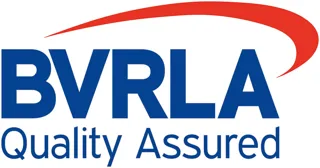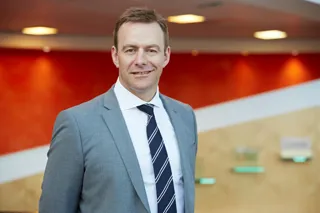After four years in his role as chief executive of the BVRLA, Gerry Keaney delivers a frank assessment of association progress.
Enabler – that’s the word used repeatedly by Gerry Keaney (pictured) during our 90-minute interview.
The chief executive of the British Vehicle Rental and Leasing Association (BVRLA), which celebrates its 50th anniversary this year, believes the leasing and rental sector, together with its fleet customers, is an enabler for Government policy, helping ministers to achieve their goals of improved air quality, mobility and connected and autonomous vehicles.
His view is based on the knowledge and experiences of the association’s diverse membership, which ranges from the UK’s biggest leasing companies, such as Lex Autolease and LeasePlan, to the smallest with fleets barely registering double figures.
Larger members have often given serious consideration to the big issues and those views can be shared with the smaller organisations. But all need to be engaged with Government policy.
Take the latest buzz phrase mobility as a Service (MaaS), which combines options from different transport providers into a single mobile service. Large leasing companies have the multi-modal, multi-ticketing and software systems to facilitate such processes. They can be an enabler to a more mobile future.
“This all comes back to how we represent our members’ needs to Government,” Keaney says. “We believe we can be an enabler in many areas. For example, air quality where we totally support the Government’s strategy. We worked with Transport for London (TfL) on the implementation on its clean air zone. Our members’ cars are all Euro 6 or ULEVs. We are seen as a partner to help them achieve their targets of improved air quality.”
Keaney became BVRLA chief executive four years ago after a 21-year career with Volvo Cars, which culminated with nine years as senior vice-president of marketing, sales and customer service.
In his first Fleet News interview shortly after his appointment, Keaney said he wanted the association to have a greater share of voice. Does he believe this has been achieved?
His answer includes a surprisingly frank self-assessment. “I came in thinking, a bit arrogantly to be honest, that this was an association whose members are buying half of all vehicles each year and how are we leveraging that influence with stakeholders, Government and other influencers,” he says.
“I was thinking about press coverage, but what we have actually done in the past four years is to focus on increasing our penetration of the key messages we want to get across.”
Keaney points to the collaboration with fleet association ACFO and Fleet News in 2014 to create the Fleet Manifesto where key stakeholders got together to agree their position on the big issues.
“That work helped us to identify the key areas where we could effect some change,” he says. “And we continue to do that on an annual basis, updating the areas that we want to focus on.”
By establishing four or five key pillars each year, the BVRLA is now more decisive in delivering its messages to Government which has increased its effectiveness and its share of voice.
Last year, for example, it had 178 communications with Government – face-to-face, responding to consultations, at parliamentary receptions, for example – which represents an increase of 100%. Those discussions took place with 25 Government bodies.
“We have never been more prominent or more active in terms of our participation,” Keaney adds.
He can point to several successes, such as revisions to the new salary sacrifice tax rules, which saw ultra-low emission vehicles removed, and the acceptance by Government that it needs a national framework for clean air zones.
“Hitherto, Government was reluctant to talk about this. But John Hayes indicated he understood the need for that at our parliamentary reception last year and it’s now included in the air quality report. That’s a good win.”
However, there remains some areas where the BVRLA has not been as effective as it would like, such as vehicle excise duty (VED) and company car tax changes.
The association would like to see better-connected discussions across key Government departments such as Treasury and HMRC, although Keaney believes there is much clearer understanding by ministers of his membership.
“When you look at MaaS, we have members providing vehicles from 15 minutes to 15 years so we can provide an umbrella over it,” he says. “We can be an enabler to a city authority to achieve its ambitions and ministers understand that. This wasn’t the case four years ago – we have now got that message across.”
One of the BVRLA’s current priorities is the speed of development of connected cars and data; members believe the Government is failing to keep up with the pace of change.
“We could see manufacturers move to a monopolistic situation regarding data capture that is anti-competitive and undermines the level playing field,” Keaney says.
“It would give manufacturers and their franchised dealers an unfair advantage at the expense of the independent garages. Also, our members with their value-added services are dependent on access to real-time data.”
BVRLA, together with counterparts such as the Independent Garage Association and Association of British Insurers, is actively lobbying Government and Brussels for regulatory protection.
“Talks are ongoing,” Keaney adds, “although there is new data protection regulations that will have to be implemented in the UK in 2018 that could be a key milestone.”
The association has the majority of leasing companies within membership, while its rental members account for around 95% of short-term transactions.
Nevertheless, Keaney believes there are as many as 500 rental companies outside of membership that he is looking to bring on board.
He recognises that while the BVRLA’s silos of leasing, rental, brokers and car share remain relevant, the landscape is changing and the lines are blurring. The association also regularly receives requests from organisations that do not fit into one of its membership streams, including, perhaps surprisingly, fleet operators.
Keaney puts this down to the 2014 Fleet Manifesto, which raised the BVRLA’s profile with fleets.
“We are already developing our strategic and policy platforms with our members’ customers and this is an area of membership that is potentially of interest,” he says, although he’s quick to add his respect for the role that the likes of ACFO, FTA and RHA play.
“By working with customers, we are getting a lot of value and they are getting a lot of value, and they have asked whether they can join. We don’t have a category and I’m not sure how it would work, but why would we exclude them?”
Top leasing sector concerns
1. Brexit
2. Connected vehicles and data
3. Air quality
4. Business car tax and VED
5. Real-world emissions tests
From humble beginnings – celebrating 50 years
Fifty years ago, six people assembled for a low-key meeting in a London hotel to discuss forming a trade association for the embryonic vehicle rental and leasing sector.
A few months later those founders of the BVRLA held their first official meeting in offices near Victoria Station. They laid out the association’s values and objectives, which remain core to its beliefs today:
1. To represent the sector
2. To work to improve the customer experience of car rental and raise the sector’s level of professionalism
3. To identify ways in which they could help and support members
Over the years, the number of products and services offered to members has increased, while the range of member categories has broadened to include leasing brokers and car clubs. The BVRLA now has 908 members who are responsible for some 4.8 million cars and vans.
However, the one constant has always been the BVRLA’s responsibility to its members.
“We have become more professional over the years but our number one role is still to represent the sector in the UK with Government and also in Europe with our support of LeaseEurope,” says chief executive Gerry Keaney.
“We are committed to a process of self-governance through our mandatory codes of conduct and audit processes for each sector, plus our conciliation services for dispute resolution which is recognised by Government. Those three values are still at our core.”






















Login to comment
Comments
No comments have been made yet.